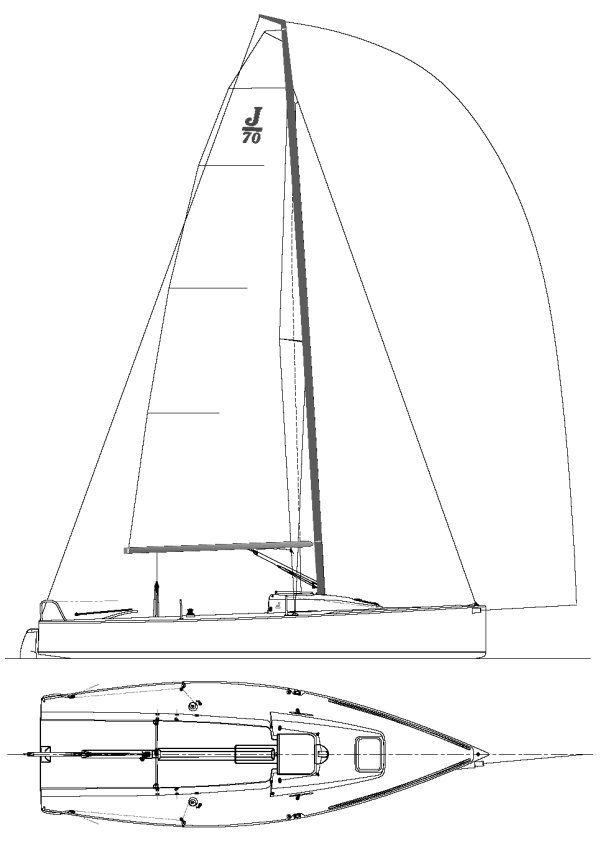The J/70, launched in 2012, is a globally recognized high-performance one-design keelboat designed and built by J Boats. This compact yet dynamic "speedster," measuring just under 23 feet, has quickly become a prominent fixture in the sailing community, renowned for its thrilling racing capabilities and ease of handling. J Boats, founded by the Johnstone family, has consistently upheld a philosophy of crafting "accessible performers," a characteristic vividly embodied by the J/70. Over 1100 units of the J/70 were delivered by 2016, establishing it as one of the most widely distributed yachts in the world.
J/70 Information, Review, Specs

- Make
- Model
- Number Built
- 1100
- Production Year(s)
- 2012 - ??
The J/70 emerged from J Boats' commitment to developing yachts that balance spirited performance with practical usability, aligning with their internal design approach. Launched into production in 2012, the primary goal behind the J/70's conception was to create a dynamic, fast, and easily manageable boat that could also be readily trailered and ramp-launched. This design specifically aimed to reinvigorate sailing club memberships by attracting younger sailors and replacing older, less contemporary keelboat fleets. The J/70's design philosophy emphasizes its role as a strict one-design class, ensuring that the fundamental concept of fair and competitive racing is maintained through carefully enforced class rules. It was also designed to accommodate a wide range of crews, making it suitable for family racing or a mix of crew weights. While J Boats' iconic J/24 was designed by Rod Johnstone, the J/70 exemplifies the company's ongoing dedication to in-house naval architecture and custom-designed, race-tested spars.
Sailing Performance and Handling
The J/70 is celebrated for its high-performance characteristics, particularly its ability to plane downwind. Its exceptional speed and dynamic feel are attributed to a sharp bow combined with flat planing sections in the hull. Sailors consistently describe the J/70 as fast, responsive, and easy to handle, contributing to its popularity in competitive one-design racing circuits worldwide. The boat’s responsiveness means that proper sail trim and boat handling, especially for upwind and downwind legs, are critical for optimal performance. Achieving maximum speed often involves avoiding over-loading the helm, indicating a well-balanced design that thrives on fine-tuning. With a theoretical hull speed of approximately 6.06 knots, the J/70 is truly built for exhilarating speed on the water.
Accommodations and Layout
Consistent with its design as a high-performance sportboat and one-design racer, the J/70 features a highly minimalist interior layout. The primary focus of the boat's design is on its sailing performance and deck ergonomics for racing, rather than extensive cruising amenities. The interior volume is largely dedicated to an open space for storing sails and racing gear, along with essential safety equipment. While specific details on berths or a dedicated galley are not prominent, the design prioritizes light weight and simplicity. The J/70 is typically considered a day sailor or a race boat, where accommodations are secondary to speed and ease of transport.
Owner's Perspectives
Owners frequently praise the J/70 for its compelling combination of competitive performance and practical features, particularly its ease of trailering, rigging, and ramp launching. This makes it highly accessible for both seasoned racers and those new to one-design sailing. Many appreciate how the J/70 has successfully invigorated local sailing scenes by attracting new and younger participants to the sport. The boat's design also allows for a diverse range of crew compositions, from professional teams to families, fostering a broad and inclusive racing community. While generally well-regarded, some early models experienced issues with furler drums, which owners have noted as a common maintenance point. Owners who consistently compete often note that maintaining a competitive edge involves regular investment in new Dacron sails, a common characteristic of active one-design racing classes.
Measurements
Construction & Hull
- Construction Material
- Fiberglass (Solid)
- Hull Type
- Monohull Sailboat
- Keel Type
- Fin
- Rudder
- 1x Transom-Hung
- Ballast
- 628 lbs (Lead)
- Displacement
- 1790 lbs
- Water Capacity
- -
- Fuel Capacity
- -
Engine
- Engine Make
- —
- Engine Model
- —
- Engine Type
- —
- Engine HP
- —
- Engine Count
- 1
- Drive Type
- —
- Fuel Type
- —
Rig & Sails
- Rig Type
- Fractional Sloop
- P (Main Luff)
- 26.16 ft
- E (Main Foot)
- 9.44 ft
- I (Foretriangle Height)
- 26.77 ft
- J (Foretriangle Base)
- 7.68 ft
- Forestay Length (est)
- 27.85 ft
- Main Sail Area
- 123.48 sqft
- Foretriangle Sail Area
- 102.8 sqft
- Total Sail Area (Reported)
- 226 sqft
- Total Sail Area (Calc)
- 226.27 sqft
Dimensions
- LOA
- 22.74 ft
- LWL
- 20.47 ft
- Beam
- 7.38 ft
- Draft
- 4.92 ft
- Max Headroom
- -
- Air Draft
- -
Calculations
- Hull Speed
- 6.06 kn
- Pounds per Inch Immersion
- 539.78